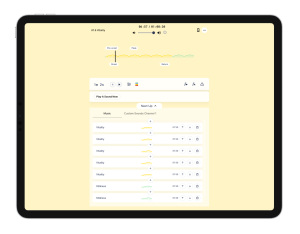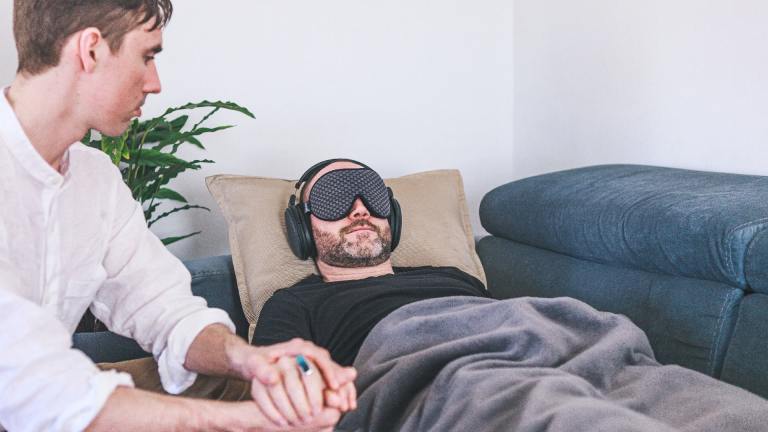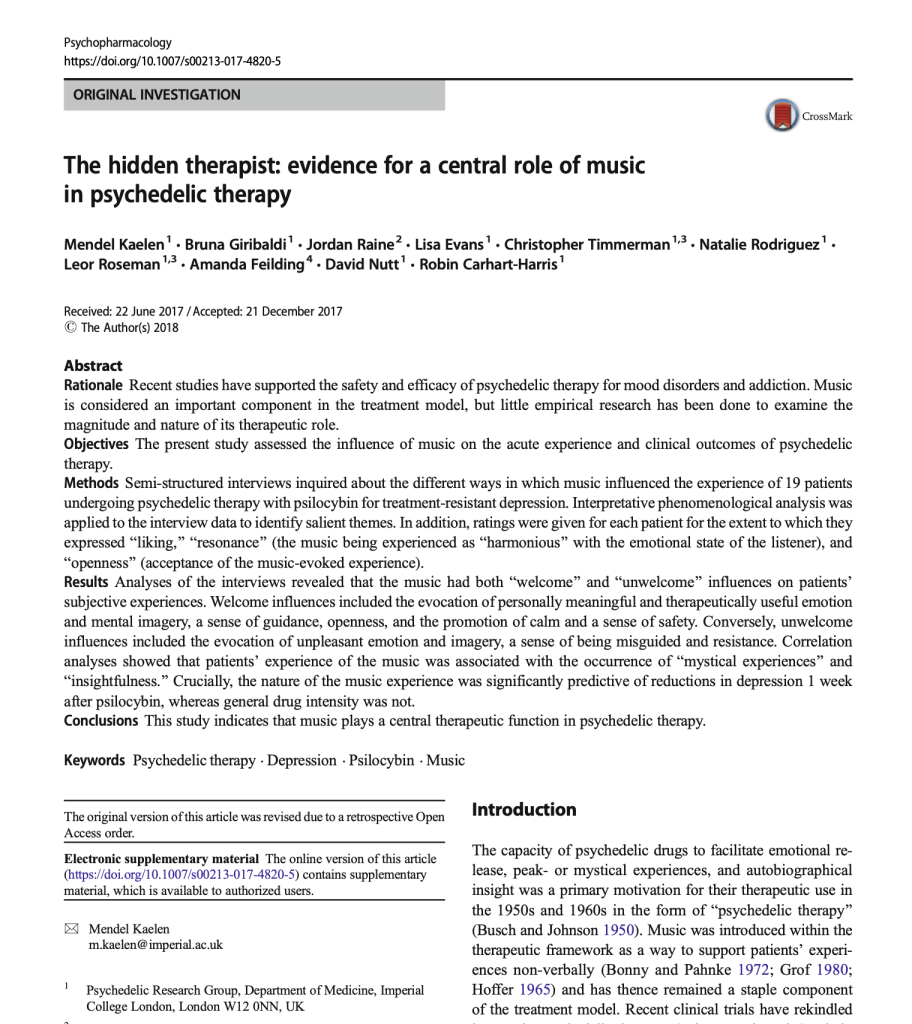
Music for Psychedelic Therapy
Designed for therapeutic work with psychedelics, including Psilocybin, MDMA and Ketamine.
Your choice of music can greatly enhance patient experiences in psychedelic therapy.
The Medicine
Wavepaths adjusts music based on the type and dosage of psychedelics to align with therapeutic needs.
The Individual
Wavepaths customizes music to match each individual’s unique needs and therapeutic goals.
The Experience
Our music supports various therapeutic functions to enhance each patient's unique experience.

Use one of our many pre-designed templates, or play an active role in designing the music experience.
Real-time music adaptation
Easily change emotionality, intensity, instrumentation, therapeutic functions and more.
Exclusively composed music
Composed with love and inspired by research.
Diverse streaming options
Play our music online or offline and stream your sessions to any device of choice.
Examples of using Wavepaths in psychedelic therapy sessions
Preparation
Support your clients' expectations and readiness for their therapy session with specially designed drug-free introspective music programs.
Match session phase
Peaking later, returning earlier or given a booster dose? Match your music with the unique pharmacodynamics of each session with one click.
Adjust emotionality
Dial the emotional intensity up or down with one click or change the music's core subjective qualities to better support your patient's experience.
Stretch durations
Prevent upcoming changes in the music to disrupt your patient experience, by extending the duration of the current music at wish.
Smooth transitions
No matter what you change, musical changes will always occur slow and fluidly to not disturb the patient experience in any way.
Integration
Share each unique session recording with your client afterwards or provide new music experiences designed to support their integration process.

Practice person-centred music
As simple as adjusting the room temperature
Remove the guesswork and prevent potential disconnection from your client when seeking to change the music.


Invite nature
Blend the finest nature sound recordings
Choose from our library or upload your own sounds and mix them with the music in as you desire
Speak a non-verbal language
Create a seamless experiential journey
We designed Wavepaths to function like an extension of the dynamic relationship between therapist, client and music.


Product Features
Therapeutic templates
Therapists often fear that they lack musical skills. You may argue that you do not play an instrument, that you do not understand music theory, or more broadly that you do not understand music enough.
Live adjustments
The reality is that these are not needed to develop the primary and most fundamental skill for working with music therapeutically.
Playback options
By awakening and fine-tuning your therapeutic musicality, this course is designed to:1. Improve your capacity to recognise distinct musical qualities. 2. Improve your ability to intuit and predict musical narratives. 3, Grow confidence in attuning and creatively modifying musical experiences.
Offline Functionality
Run sessions locally and independent of the internet using our offline portal.
Mix your own sounds
Mix voice guidance, sounds or nature environments from yourself or our library.
Preparation & Integration
Share one of our preparation programs ahead of the session or share the recording of the session with your client .

Therapeutic Functions
Soothing
Provide a soothing, stabilising and reassuring climate.
Deepening
Support processing subjective experiences and personal memories.
Releasing
Promote strong emotional expression, release and resolution.
Bridging
Stimulate movement and change by adding powerful dynamics to the music.
Holding
Support a significant therapeutic moment by extending the current music experience at wish.
Quieting
Honour important moments of rest and quiet during a session

Support
Practitioner community
Continue to develop your practice alongside peers and experts in Wavepaths practitioner community.
Personalised training
Build confidence in working with music in a person-centred way with 1:1 training and onboarding.
Not quite ready
Join below to be informed of new developments regarding Wavepaths for care-providers
Wavepaths Pricing
Plan
Best Suited For:
Price
Account
- Number of Users
- Sessions Running at Once
- On-Demand Education
- Onboarding Call
- Staff Training
- Audio Setup Assistance
Music
- Exclusive to Wavepaths
- 5 Distinct Therapeutic Functions
- Offline Use
- Remote Session Streaming
- Multiple Audio Outputs
- Custom Sounds
- Session Music Design Assistance
Session Management
- Edit and Save Custom Templates
- Music Recommendations
- Share Recordings with Clients
Adaptive Controls
- Adapt Emotional Intensity
- Adapt Emotional Qualities
- Change Instruments
- Stretch Music Durations
Light
Small Private Practices
$30/month
Account
- 1
- 1
- ✓
- -
- -
- -
Music
- ✓
- ✓
- ✓
- -
- -
- Curated by Wavepaths
- -
Management
- ✓
- -
- -
Adapt
- ✓
- ✓
- ✓
- ✓
Basic
Private Practices or Small Clinics
$100/month
Account
- 1
- 1
- ✓
- 30 Minutes
- -
- -
Music
- ✓
- ✓
- ✓
- ✓
- ✓
- Curated + Own Uploads
- -
Management
- ✓
- ✓
- ✓
Adapt
- ✓
- ✓
- ✓
- ✓
Pro
Large Clinics or Research Centres
$200+ /month
Account
- 4+
- 4+
- ✓
- 60 Minutes
- ✓
- ✓
Music
- ✓
- ✓
- ✓
- ✓
- ✓
- Curated + Own Uploads
- ✓
Management
- ✓
- ✓
- ✓
Adapt
- ✓
- ✓
- ✓
- ✓
Wavepaths' Pricing
Light
For Students
$30/mo
Up to 15 hours of music
Account & Education
- 1 User
- Community Access & On-demand Education
Music
- Music Licensed for Therapeutic Use
- Exclusive, Evidence-Based, World-Class Music
Session Management
- Access Pre-designed Sessions by Use Case
- Tailor Modality, Duration & Musical Preference
- Client Preparation Support
Adaptation
- Skip Forward
- Silence / Pause
Basic
For Small Practices
$100/month
Up to 115 hours of music
Full customisation & real-time adaptation
Account & Education
- 1 User
- Community Access & On-demand Education
Music
- Music Licensed for Therapeutic Use
- Exclusive, Evidence-Based, World-Class Music
Session Management
- Access Pre-designed Sessions by Use Case
- Tailor Modality, Duration & Musical Preference
- Client Preparation Support
- Integration Support: Share Sessions w/ Clients
- Edit + Save Custom Templates
- Offline Use
- Stream Live Sessions to Other Devices
Adaptation
- Skip Forward
- Silence / Pause
- Adapt Intensity and Emotionality
- Extend Moments to Hold Space for Clients
- Edit Upcoming Music
- Live Instrument Swapping
Pro
For Large Practices
$200/month
115+ hours of music*
Full customisation & real-time adaptation
Account & Education
- 4 Users
- Community Access & On-demand Education
- 1:1 Onboarding & Priority Account Management
- Custom Therapeutic Program Design
- Custom Music for Ambient Spaces
Music
- Music Licensed for Therapeutic Use
- Exclusive, Evidence-Based, World-Class Music
Session Management
- Access Pre-designed Sessions by Use Case
- Tailor Modality, Duration & Musical Preference
- Client Preparation Support
- Integration Support: Share Sessions w/ Clients
- Edit + Save Custom Templates
- Offline Use
- Stream Live Sessions to Other Devices
Adaptation
- Skip Forward
- Silence / Pause
- Adapt Intensity and Emotionality
- Extend Moments to Hold Space for Clients
- Edit Upcoming Music
- Live Instrument Swapping
*500 Hours $750
FAQs
Wavepaths tailors music to align with the type and dosage of psychedelics, adapting in real-time to enhance the therapeutic experience and support patient outcomes.
Key features include real-time music adaptation, exclusive therapeutic compositions, versatile streaming options, and offline functionality.
Yes, you can start a free trial to experience Wavepaths' capabilities and see how it fits your therapeutic needs.
Music for Psychedelic Therapy
Music is critical to the positive outcomes during psychedelic therapy.
It can make or break a psychedelic experience, powerfully shaping and synergising with it in a number of ways, acting as both an anchor and a guide rope.
Music is a uniquely dynamic, flexible and multifaceted sensorial experience that can serve a number of different functions in a therapeutic context.
Music can:
- help calm and soothe
- evoke autobiographical memories and visual imagery
- help foster psychological insight
- facilitate emotional reconnection and release
- elicit meaning and emotions such as wonder and transcendence and support the occurrence of peak experiences
- influence the long-term beneficial outcomes associated with psychedelic therapy
In this article, explore:
- the various ways in which music contributes to the therapeutic application of psychedelics
- the vital role music plays in influencing positive therapeutic outcomes
- the various aspects of music that constitute its effective application in a psychedelic therapy
It can make or break a psychedelic experience, powerfully shaping and synergising with it in a number of ways, acting as both an anchor and a guide rope.
Music in Psychedelic Therapy: From Shamanic Contexts to Neuroscientific Research
Music is intimately woven into the fabric of psychedelic ceremonies in indigenous shamanic contexts.
For example:
- ayahuasca shamans sing icaros and shake leaf rattle chakapas
- peyoteros sing songs accompanied by a rattle and water drum
- Bwiti iboga shamans pluck mungongo musical bows and ngombi harps
Outside the context of psychedelic usage, sound and music has also found wide ceremonial application as a way of altering consciousness, with ritualised drumming considered as one of the most ancient techniques for altering consciousness employed by humankind.
Modern neuroscientific research is beginning to reveal some of the brain mechanisms that underpin music’s power to move us.
The transformative power of music is highlighted by studies showing that it can provoke peak or transcendent experiences even outside the context of psychedelic therapy.
An internal study on Wavepaths Deep Listening found that an immersive music-listening with Wavepaths music could facilitate powerful experiences that were deeply meaningful to people.
Similar to psychedelic therapy, the quality of such experiences was found to influence increases in well-being post experience. Wavepaths is currently collaborating on clinical studies with McGill and University of Washington (with more partnerships with leading academic institutions in the pipeline) to further develop this body of research.
Music is central to Psychedelic Therapy
The pivotal role music plays in psychedelic ceremonies has long been recognised, it having been referred to as “the hidden therapist”.
Music synergises with psychedelic experiences in a number of ways that support the therapeutic process.
Through music’s power to influence emotions, therapists can help guide clients through what can be a very uncertain, and at times potentially turbulent and challenging experience. With the dissolution of familiar structures of time and space under a high dose of a psychedelic, music can create a new form of structure and narrative in the midst of the psychedelic state, helping guide people through their inner ocean of mind.
...music can create a new form of structure and narrative in the midst of the psychedelic state, helping guide people through their inner ocean of mind.
Music, psychedelics and the brain
Psychedelics selectively bind to a certain type of serotonin receptor in the brain, this being an important mechanism underlying their effect. The serotonergic system also responds specifically to sound, and this property of psychedelics is also what influences music perception while under their influence.
Brain regions governing emotional processing appear to be recruited by the interaction of psychedelics and music, and the musical quality of timbre or tone quality appears to play an important role in eliciting heightened emotional states under psychedelics.
When used in a therapeutic context, music is one of the primary sensory inputs people experience. When psychedelics are used in this context, people tend to be lying down on a sofa or bed, wearing eyeshades and headphones – the action is taking place internally, and music is acting at various times as anchor, propellant and guide.
Music may be the primary sensory input people experience for many hours during a psychedelic session. The integral importance of music in influencing positive outcomes in psychedelic therapy was recognised in the first wave of psychedelic research in the 1950’s and 60’s before prohibition.
The openness and receptivity of the psychedelic state powerfully synergises with music, and by shaping the psychedelic experience in a deep and fundamental way, music has the power to shape not just the experience itself, but the long-term outcomes associated with it.
Musical selection in the acute psychedelic state may even have the potential to affect personality change in an enduring sense post session, through driving brain entropy which influences openness post experience, and by helping catalyse psychological insight, may in turn help reduce neuroticism, this having important therapeutic implications.
Music for Psychedelic Therapy: Mystical experiences, insight and openness
Studies looking at the effects of psilocybin and LSD have found that music can support the occurrence of mystical experiences (key determinants of the beneficial outcomes of psychedelic therapy), while also playing a role in catalysing positive changes post session, including a reduction in depression scores and enhanced openness. This influence was found to be even more impactful at shaping outcomes than the intensity of the drug effect, which was not found to predict such changes in either case.
Music can also assist in calaysing experiences of insight, which are integral to the therapeutic process. Experiences of insight in turn have been associated with shifts in personality post psychedelic session, with decreased neuroticism and increased extraversion reported. Such personality shifts could have important implications for health, well-being and cognition, with high levels of neuroticism being a predictor of a range of mental and physical health disorders, while influencing the quality and longevity of our lives.
Openness is uniquely tied to cognitive ability among the ‘big five’ personality traits, and associated with creativity and qualities such as appreciation for new experiences, aesthetics, imagination, and hunger for knowledge.

The Role of Music for Psychedelic Therapy
Music can play radically different experiential roles, by being both activating and directive in some instances, and also calming and non-directive in others.
The broad potential of music gives it unique therapeutic utility.
When used in a directive or suggestive conext, music can help facilitate an immersive journey, and help elicit meaningful thoughts, emotionality and imagery.
In a non-directive context, music can play a calming and soothing role, which in turn helps facilitate feelings of safety and openness to the experience. This calming effect of music is important, as feelings of safety and security that music can help promote can also help people feel more open and receptive to information and insights coming up during their experiences.
Music under a psychedelic can enhance connectivity between brain regions, which can help stimulate the recollection of autobiographical memories and evoke mental imagery, likely an important aspect of its therapeutic power. It can also enhance feelings of ascribed meaningfulness and feelings of wonder and transcendence, considered core emotional aspects of psychedelic mystical experiences.
What is Psychedelic Therapy Music?
The various distinct phases of a psychedelic experience – Pre-onset, Onset, Peak and Return – all require music that will resonate with people through the unfolding experience.
Selecting the appropriate music for an individual’s psychedelic session is vital.
Research conducted by Wavepaths CEO Mendel Kaelen and collaborators has shown that people undergoing psychedelic sessions are more receptive to music that was in resonance with their emotional experience under the psychedelic, and this was also tied to clinical outcomes, with a greater reduction in depression symptoms. However if the music was felt to be jarring with people’s emotional state, it could evoke resistance and be counter-therapeutic.
Every individual has their own unique needs and preferences, and these can change throughout a psychedelic experience. There can be dramatic shifts in people’s emotional state during a psychedelic session – from ecstatic bliss and joy to fear, sorrow and sadness.
Psychedelic experiences are as unique as the individuals undertaking them, and because of this, there is no one size fits all approach when it comes to curating music for psychedelic therapy. This is why Wavepaths has worked so hard to create unique, personalised, adaptive music experiences that promote mental health and well-being.
Best Music for a Psychedelic Trip
A range of factors contribute to the utility of music when applied in a therapeutic psychedelic context.
A survey of individuals who have experience administering psilocybin (on a minimum of 50 occasions) in a therapeutic context sought to identify features of music supportive of the occurrence of mystical experiences.
Music with “regular, predictable, formulaic phrase structure, and orchestration, a feeling of continuous movement and forward motion that slowly builds over time, and lower perceptual brightness when compared to pre peak music” was found to be supportive of such experiences.
Music involving recognisable vocals is better excluded from psychedelic session music playlists, as exposure to language during a psychedelic experience may reduce chances of mystical experiences from occurring. In addition, language in the form of lyrics is likely to be directive in certain ways which may not always be advantageous for the fine tuned nature of psychedelic sessions.
Types of music may differ in their capacity to support the occurrence of mystical experiences.
One small study suggests that overtone-based music (emphasising instruments with a particularly strong overtone signature, such as Tibetan singing bowls, gongs, didgeridoo, chimes, bells, sitar, human voice overtone singing) was associated with greater mystical experience scores than compositions dominated by Western classical music, which until recently, have tended to dominate playlists used for psychedelic sessions. This highlights the importance of exploring other forms of music, and of the work Wavepaths is doing seeking to optimise the musical component of psychedelic sessions for the individual client.
Music for Psychedelic Therapy: Go where playlists can’t take you
Set playlists are not suited to the highly dynamic and subjective experience of an individual undergoing a psychedelic session and may increase the likelihood of unwelcome effects.
Informed by research, and underpinned by intelligent technology and collaboration with world class artists, Wavepaths is able to provide such a personalised, adaptive, completely unique musical experience for clients every time.
Practitioners are able to automatically adapt the music to the medicine, the route of administration and the dosage when curating sessions.
Sessions can be run live – in person or remotely, or scheduled to be experienced at a later time in the comfort of a client’s home.
Learn more about Wavepaths, and discover the world’s first person-centred music solution for psychedelic therapy.
